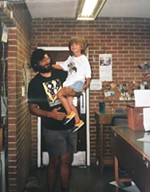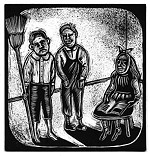Summer Reading
By Ada Calhoun, Fri., June 1, 2001

Shiksa Goddess, Or, How I Spent My Forties: Essays
by Wendy WassersteinKnopf, 235 pp., $23
Wendy Wasserstein is mistress of a self-conscious, neurotic style specific to New York and a casual regard for decadence specific to the Upper East Side. The Pulitzer Prize-winning playwright (author of The Heidi Chronicles and The Sisters Rosensweig, among others) is a self-described "nice Jewish girl from Brooklyn." Obsessed with the salvific properties of theatre, her unruly weight, and her famous friends, she is Uptown Manhattan's middle-aged answer to Bridget Jones.
This collection of essays, her first in 10 years, is a hodgepodge of Wassersteinian musings by turns jokey, political, shallow, and deeply personal. The last two stories, "How I Spent My Forties" and "Days of Awe: The Birth of Lucy Jane" are of the personal persuasion, and relate the loss of her sister to breast cancer and her prolific attempts to get pregnant. These efforts culminate in the premature birth of 48-year-old Wasserstein's daughter, Lucy Jane. Though Wasserstein is a comedic writer by reputation, these wrenching autobiographical essays are by far the most powerful of the bunch.
By contrast, fluffy pieces like the mini-biography of Mrs. Entenmann, czarina of the baked-goods world, and the confessional "Shiksa Goddess" about Wasserstein's realization that she is, in fact, Episcopalian, read like New Yorker stories, as readable as they are forgettable. Wasserstein slobbers over several stars, including Bette Midler and Jamie Lee Curtis, and drops names like they're burning her hands: "I invite Forrest Sawyer, the ABC anchorman, and Bill Finn and his friend Arthur Salvatore for dinner ... "
A diehard member of various arts committees and foundations, Wasserstein is an advocate for not-for-profit theatre and art education. In "A Place They'd Never Seen: the Theater," Wasserstein takes several underprivileged Bronx high school students to a series of plays and argues through them that the theater is not only for the elite. Her similarly themed essay "The State of the Arts" is about lobbying Congress for Federal grants for the arts. While the case Wasserstein makes for art as a national priority is earnest almost to a fault, she does have a nice little spitting match with Newt Gingrich in which he confuses Arthur Murray with Arthur Miller.
Wasserstein does not come off in this book as an especially deep thinker, rendering her diary-style entries rather thin. This is a woman who quotes Stephen Sondheim lyrics to prove points. She typifies the baby-obsessed career woman in her mid-40s. She dreams about living in a hotel (which she did, without shame, for a year, and documents in the essay "How Suite It Is"). Still, because of its light tone, Shiksa Goddess is as breezy a read as one is apt to find, and it ends on a remarkably sweet note.








